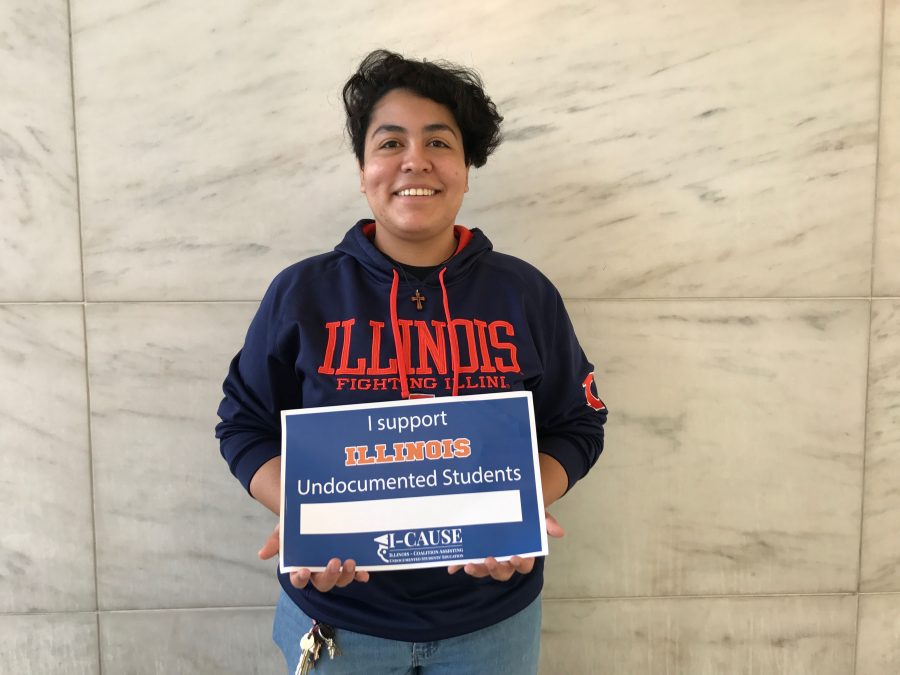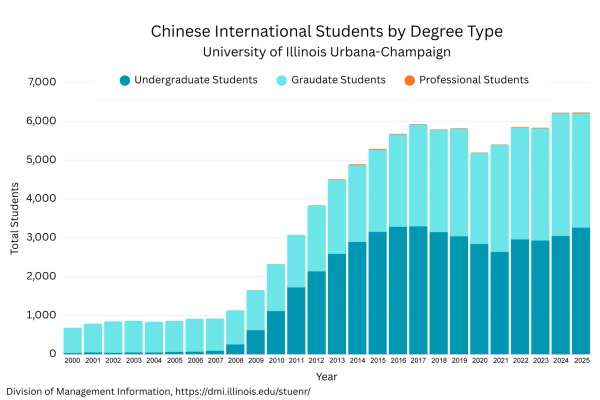University launches website for undocumented, DACA students
Ana Rodas, a DACA holder and junior in FAA, has struggled to find resources for undocumented students. She hopes a new University website will change that.
Feb 24, 2017
Last updated on Feb. 26, 2017 at 05:58 p.m.
While no arrests or threats seem imminent on campus, the University is responding to increased deportation rhetoric by providing information for undocumented students.
“I can’t recall one time we asked about the immigration status of a student,” UIPD Police Chief Jeff Christensen said at a January Senate Executive Committee meeting. “We’re not asking about immigration status. It’s not happening.”
Regardless, the University launched a website last week to connect current and prospective undocumented and Deferred Action for Childhood Arrival (DACA) students to resources.
The site includes information about eligibility for admission and financial aid, legislation, campus resources, scholarships and legal rights. Planning for the website started in June, but its debut comes due to President Donald Trump instructing his administration to aggressively enforce immigration laws and increase deportations.
Get The Daily Illini in your inbox!
Developed under former president Barack Obama, DACA shields children under the age of 16 who were brought to the country illegally from deportation. Some undocumented and DACA students have struggled to find campus resources.
Ana Rodas, of DACA status and junior in FAA, said a fellow member of Illinois Coalition Assisting Undocumented Students’ Education, I-CAUSE, labeled the search for resources the “Illini Shuffle.” Students would travel to various campus offices searching for answers.
“They’re nowhere to be found because nobody knows,” she said.
Rodas thinks the website will solve the problem. If the University cannot provide the resource for students, the website guides them to other options.
Student Legal Services cannot represent students in immigration cases since the attorneys do not specialize in that area. Instead, the website includes links to outside resources.
Robin Kaler, spokesperson for the University, hopes the website reinforces the institution’s philosophy on DACA.
“They’re covered by DACA, so we want to treat them as though they are welcome, valued members of our community — because they are,” she said. “It’s really important to us for them to know this is their home, and they are welcome here.”
The University does not require undocumented students to identify themselves, so the total is unclear. Officials estimate there are between 100 and 150 such students.
These students are not eligible for federal or state financial aid. Gioconda Guerra Pérez, director of La Casa Cultural Latina, said the website includes private scholarship information to help students find financial support.
Finding scholarships can be difficult for undocumented students. Rodas said she works four jobs to pay for school. She is a resident assistant at Barton and Lundgren Halls, a lead ambassador and a graphic designer for La Casa and the department of Latina/Latino Studies.
“A lot of us are worried about getting a 4.0 GPA and being a full-time student,” she said. “They don’t take those obstacles into consideration.”
Rodas worries that her future on campus is not guaranteed. She tries to stay positive and focuses on support for undocumented students she has seen lately.
La Casa and I-CAUSE hosted an ally workshop last week to educate students and faculty about undocumented student issues. The event reached capacity and even had a waiting list.
La Casa has hosted similar events. Pérez hopes they provide the greater campus community with information to have meaningful conversations.
“Many times, we assume things without even knowing the roots or the causes of why people immigrate, or why people are here, why they have this particular status or do not have status,” she said. “We tend to make comments that are not accurate or are misinformed, and if we do not educate, then we continue expanding that misinformation, misconception of certain issues.”
As policies surrounding undocumented immigrants continue to develop, Pérez is trying to create more outreach efforts. The issue does not appear to be going away anytime soon.






